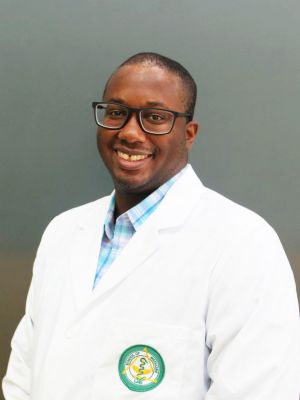Written by Hannah Weems
 Every so often, an idea sparks that has the potential to make a big change. Michael Williams, M.D., M.Sc., Neuropathology Fellow in the UAB Department of Pathology, had one such idea earlier this year when he felt inspired to develop a podcast to highlight diversity in the field of pathology.
Every so often, an idea sparks that has the potential to make a big change. Michael Williams, M.D., M.Sc., Neuropathology Fellow in the UAB Department of Pathology, had one such idea earlier this year when he felt inspired to develop a podcast to highlight diversity in the field of pathology.
“I had been a guest speaker on several podcasts before,” says Dr. Williams. “In light of the events surrounding the death of George Floyd in 2020, I knew I wanted to hear more diverse voices and stories.” Williams researched, strategized, and planned for months before deciding to take a bold leap to launch the Diversify in Path Podcast in August.
Diversify in Path provides an environment for the BIPOC community in the field of pathology to share their stories and experiences. Williams believes that diversifying pathology will lead to growth in the field. His ultimate hope is to inspire potential pathologists and create a welcoming space for all. Michael Williams, M.D., M.Sc., Neuropathology Fellow
Michael Williams, M.D., M.Sc., Neuropathology Fellow
“I was initially exposed to very few BIPOC residents, fellows, or medical students,” says Williams, when asked about his own education and training experience. It was social media tools that began to broaden his network with other BIPOC pathologists telling their own stories.
He notes that social media has afforded him many opportunities, including valuable friendships and events leading to his poster “Reaching the Millennial applicant: Impact of social media presence on residency recruitment,” which he presented at the 2020 USCAP Annual Meeting in Los Angeles. Williams was encouraged to use social media during his residency at the State University of New York’s Upstate Medical University, then grew to appreciate the tool and began growing his platform, @bluehatcomics85. Now he is inviting many of the connections he has maintained on Twitter to be speakers on the podcast.
Diversify in Path’s inaugural episode features Nicole Jackson, M.D., M.P.H., an Assistant Medical Examiner in Chicago, who discusses the importance of mentorship, community outreach, and mental health and wellness. She shares her experiences as a new forensic pathologist during the outset of the pandemic and her thoughts on diversity in pathology. “We need to be engaging people that are underrepresented by any metric, earlier,” Jackson says when asked how to increase diversity in the field.
In the next episode, Bettie Yeboah, M.D., a PGY1 in the University of Virginia’s Department of Pathology, highlights growing up with immigrant parents and discusses the importance of recognizing disease manifestations across varying skin tones. She encourages medical students applying for the match to, “shoot for the stars,” in episode two.
“The ultimate goal,” Williams says, “is to grow a meaningful platform for each and every voice to be heard.” He will continue to release episodes each Thursday. Investing in diversity, he says, can lead to a high return in pathology and laboratory medicine by learning from the knowledge and experiences of diverse voices within the field.